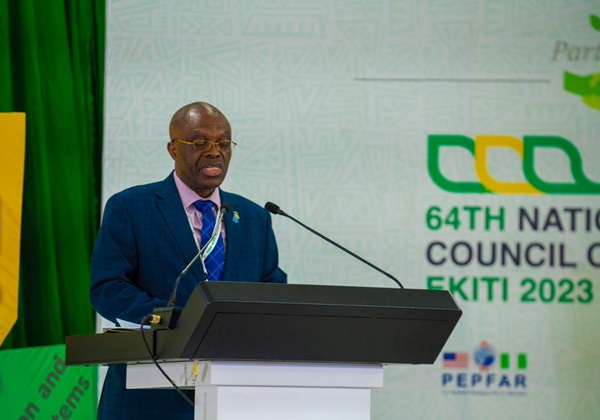
In a proactive move, the World Health Organisation (WHO) has highlighted the crucial role of collaborative strategies in building an inclusive and resilient healthcare system in Nigeria.
The WHO representative in Nigeria, Dr. Walter Mulombo emphasised this during the opening ceremony of the 64th National Council on Health (NCH) in Ado-Ekiti.
The NCH, an apex policymaking body in Nigeria’s health sector, annually brings together federal and state leaders, along with partners, to collectively evaluate, co-create and make substantial decisions on health-related issues. This year’s theme, ‘Building the Resilience and Inclusive Health Care System for a Healthy Nigeria’, underscores the significance of a robust healthcare system.
Mulombo underscored the unique platform that the NCH provides, serving as a space for collaborative discussions and decision-making. He highlighted the sub-themes, addressing critical health issues that require collective attention.
Delving into pressing challenges, Mulombo addressed issues such as high out-of-pocket expenditures and the complex landscape of communicable and non-communicable diseases. He stressed the need for uncommon reforms in Nigeria’s health sector, recognising the urgency for transformative changes.
Commending Nigeria’s prioritisation of primary healthcare and health financing as key drivers toward Universal Health Coverage (UHC) and the Sustainable Development Goals (SDGs), Mulombo called for a shift from conceptualization to actionable results, aligning with international commitments.
Anticipating the NCH’s role, he emphasised leveraging strengths and opportunities at all government levels. He stressed the importance of crafting feasible, sustainable and less complex strategies under the Health Sector Renewal Investment Programme.
Reaffirming WHO’s commitment, Mulombo aligned the organization’s efforts with the renewed hope agenda, reflecting in the strategic pillars of the Health Sector Renewal Investment Programme. He suggested exploring innovative approaches for continuous engagement between the Federal Ministry of Health and the States to enhance performance tracking and effective implementation of council resolutions.
In a forward-looking gesture, Mulombo acknowledged the collective efforts of various sectors, partners, stakeholders and community members. He emphasised health as a shared responsibility and expressed hope that the collaborative spirit ignited by this historic event will empower and inspire actions that promote, provide, and protect health for all Nigerians.

